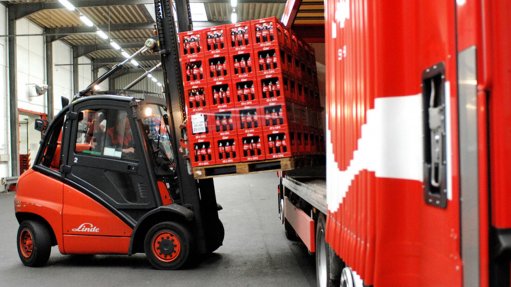Soaring fuel prices threaten to slam brakes on economic growth
This article has been supplied as a media statement and is not written by Creamer Media. It may be available only for a limited time on this website.
The road transport logistics industry is the backbone of efficient supply chains and soaring fuel prices will, therefore, also have a direct negative impact on the productivity and growth of a country’s economy.
As a leading participant in the South African road transport logistics sector, Cargo Carriers continues to invest heavily into mitigating its exposure to this risk, but cautions that fuel prices will place an additional heavy burden on the entire road-freight sector, as well as already-beleaguered industrial segments of the economy.
Diesel remains the lifeblood of a transport-intensive country where comparatively more tonne-kilometres are required to contribute US$1 to the gross-domestic product.
The bulk of the country’s freight is moved via a vast road network, and this includes the large tonnages of cementitious products, fuels and chemicals, as well as steel that are safely transported by Cargo Carriers on behalf of leading industrial sectors of the economy.
In 2017, the company’s sizeable fleet covered well over 19-million kilometres on behalf of its many customers, some of which are operating in strained environments and depend upon an innovative and efficient transport solution to retain a competitive edge.
For example, the company has remained a strategic partner to participants in both the cement and steel production sectors, which have been directly impacted by reduced spending on infrastructure by state and a sharp decline in private-sector property development projects due to an underperforming economy.
Cement producers rely on Cargo Carriers’ ability to reduce their transportation costs, in addition to the excellence of its service and willingness to invest in logistics infrastructure as partners.
Meanwhile, the company has an acute understanding of the unique challenges that prevail in both the primary and downstream steel markets and it, therefore, continues to work closely with industry participants to deliver solutions that optimise their operations.
Fuel price hikes will also have a profound negative impact on the many other strategic sectors of the economy that rely on road to efficiently transport goods.
Road-freight companies transport well over 80% of South Africa’s freight, and this includes the lion’s share of goods that are being transported over distances of more than 600 kilometres from Gauteng, the country’s main economic hub, to the closest ports along the coast.
Primary bulk export commodities, which are mostly located within the interior of the country, are also conveniently moved to the ports via road, despite concerted attempts by state to migrate tonnages to rail.
South Africa’s long economic reliance on high-value imported consumer goods and low-value bulk exports has also contributed towards intensive transport operations, and this has been exacerbated by historical spatial planning that used large distances to segregate communities.
Meanwhile, local distribution of manufactured and agricultural goods between dispersed centres is just as onerous, in terms of transport operations.
Cargo Carriers’ sugar producing customers, for example, have also been grappling with fluctuating crude oil costs, in addition to volatile market prices, fierce international competition and the impact of changes in climatic conditions, such as drought.
The company’s sophisticated and cost-effective transport solutions have played a large part in assisting them improve their performance in these challenging conditions.
By June, diesel prices peaked to new highs since December 2017 due to higher crude oil prices on the back of weaker Rand/Dollar exchange rate.
The higher prices for fuel are as a result of sustained production cuts by the Organisation of Petroleum Exporting Countries and interruptions to production in strife-torn Venezuela.
As a net importer of fuel, South Africa’s road transporters will remain vulnerable to the volatility of crude prices, which varied from US$13 and as much as US$23 per barrel in the 1990s and between US$24 and a staggering $104 per barrel since 2000.
In 2010, it averaged US$79 per barrel and soared from US$70,88 to US$77 this year.
Meanwhile, the depreciation of the Rand is as a result of a stronger US Dollar, leading to negative emerging market sentiment. Other emerging currencies also lost gains due to a rise in United States Treasury bond yields.
Worryingly, the country is expecting additional hikes later this year, and this risk will have to be carefully managed to mitigate its impact on the larger road transport logistics industry.
Cargo Carriers has a long and impressive track record using fuel efficiently in line with the company’s commitment to reducing its carbon footprint, of which fuel is the largest contributor and a finite resource that needs to be conserved.
Impressively, these efforts led to as much as a 4% reduction in its carbon footprint in 2017.
Sophisticated information technology has been harnessed to constantly monitor the efficient use of diesel, while patented trailers have helped reduce fuel burn in specialist operations.
These initiatives are complemented by the company’s ongoing focus on honing the skills of drivers, as well as a robust fleet maintenance and replacement strategy that prioritises fuel efficiencies.
Cargo Carriers is committed to assisting its customers remain competitive in a challenging economic environment, and will continue to adopt a proactive approach to managing this very real risk to the backbone of the economy.
Comments
Announcements
What's On
Subscribe to improve your user experience...
Option 1 (equivalent of R125 a month):
Receive a weekly copy of Creamer Media's Engineering News & Mining Weekly magazine
(print copy for those in South Africa and e-magazine for those outside of South Africa)
Receive daily email newsletters
Access to full search results
Access archive of magazine back copies
Access to Projects in Progress
Access to ONE Research Report of your choice in PDF format
Option 2 (equivalent of R375 a month):
All benefits from Option 1
PLUS
Access to Creamer Media's Research Channel Africa for ALL Research Reports, in PDF format, on various industrial and mining sectors
including Electricity; Water; Energy Transition; Hydrogen; Roads, Rail and Ports; Coal; Gold; Platinum; Battery Metals; etc.
Already a subscriber?
Forgotten your password?
Receive weekly copy of Creamer Media's Engineering News & Mining Weekly magazine (print copy for those in South Africa and e-magazine for those outside of South Africa)
➕
Recieve daily email newsletters
➕
Access to full search results
➕
Access archive of magazine back copies
➕
Access to Projects in Progress
➕
Access to ONE Research Report of your choice in PDF format
RESEARCH CHANNEL AFRICA
R4500 (equivalent of R375 a month)
SUBSCRIBEAll benefits from Option 1
➕
Access to Creamer Media's Research Channel Africa for ALL Research Reports on various industrial and mining sectors, in PDF format, including on:
Electricity
➕
Water
➕
Energy Transition
➕
Hydrogen
➕
Roads, Rail and Ports
➕
Coal
➕
Gold
➕
Platinum
➕
Battery Metals
➕
etc.
Receive all benefits from Option 1 or Option 2 delivered to numerous people at your company
➕
Multiple User names and Passwords for simultaneous log-ins
➕
Intranet integration access to all in your organisation





















